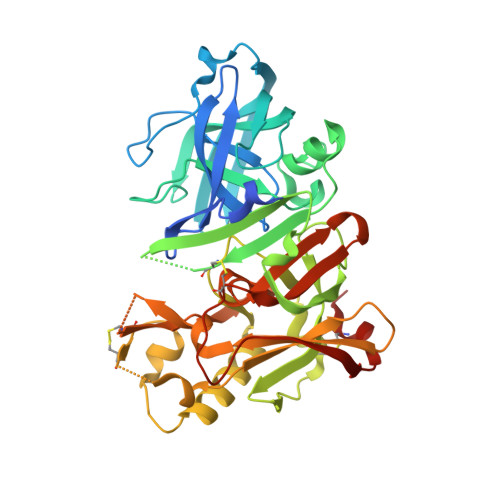Development of 2-aminooxazoline 3-azaxanthenes as orally efficacious beta-secretase inhibitors for the potential treatment of Alzheimer's disease.
Chen, J.J., Liu, Q., Yuan, C., Gore, V., Lopez, P., Ma, V., Amegadzie, A., Qian, W., Judd, T.C., Minatti, A.E., Brown, J., Cheng, Y., Xue, M., Zhong, W., Dineen, T.A., Epstein, O., Human, J., Kreiman, C., Marx, I., Weiss, M.M., Hitchcock, S.A., Powers, T.S., Chen, K., Wen, P.H., Whittington, D.A., Cheng, A.C., Bartberger, M.D., Hickman, D., Werner, J.A., Vargas, H.M., Everds, N.E., Vonderfecht, S.L., Dunn, R.T., Wood, S., Fremeau, R.T., White, R.D., Patel, V.F.(2015) Bioorg Med Chem Lett 25: 767-774
- PubMed: 25613679
- DOI: https://doi.org/10.1016/j.bmcl.2014.12.092
- Primary Citation of Related Structures:
4XKX - PubMed Abstract:
The β-site amyloid precursor protein (APP) cleaving enzyme 1 (BACE1) is one of the most hotly pursued targets for the treatment of Alzheimer's disease. We used a structure- and property-based drug design approach to identify 2-aminooxazoline 3-azaxanthenes as potent BACE1 inhibitors which significantly reduced CSF and brain Aβ levels in a rat pharmacodynamic model. Compared to the initial lead 2, compound 28 exhibited reduced potential for QTc prolongation in a non-human primate cardiovascular safety model.
Organizational Affiliation:
Department of Medicinal Chemistry, Amgen Inc., One Amgen Center Drive, Thousand Oaks, CA 91320, USA. Electronic address: jianc@amgen.com.

















